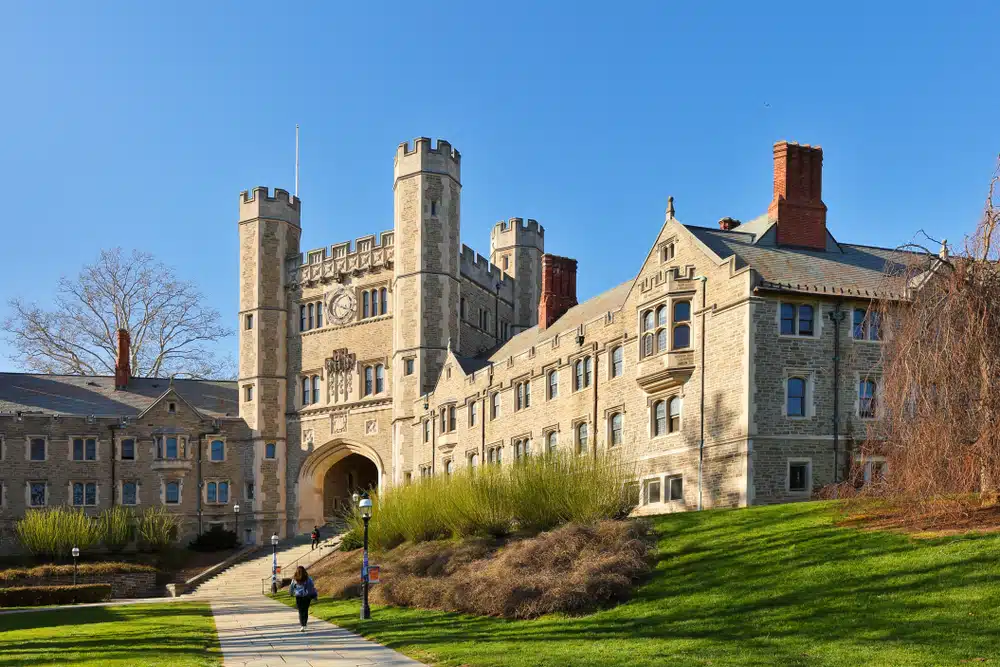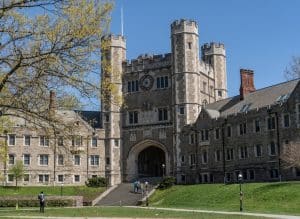Princeton University’s Enrollment Trends
Princeton University, renowned for its academic excellence and rich history, has witnessed notable shifts in enrollment over the years. Understanding the dynamics of enrollment trends is crucial in assessing the university’s growth, adaptability, and overall impact on the education landscape. This article delves into the various aspects of Princeton University’s enrollment history, current patterns, and future projections.
The Basics of University Enrollment
Before analyzing Princeton’s enrollment trends, it is essential to comprehend the fundamental concepts of university enrollment. Enrollment refers to the number of students who have officially registered and are pursuing academic programs at an institution. This metric includes both undergraduate and graduate students.
The enrollment levels in a university can vary based on several factors, including student demand, institutional capacity, educational offerings, and external influences. Examining these factors sheds light on the significance of enrollment trends and their role in shaping a university’s reputation and educational impact.
When it comes to student demand, various factors come into play. The reputation of the university, the quality of its academic programs, and the success of its graduates all contribute to the interest and desire of prospective students to enroll. Additionally, factors such as location, campus facilities, and extracurricular opportunities can also influence student demand.
Institutional capacity refers to the physical and logistical resources that a university has to accommodate students. This includes the number of classrooms, dormitories, and faculty members available to support the educational needs of the student body. Universities with limited capacity may face challenges in meeting the demand for enrollment, leading to more competitive admission processes.
Educational offerings play a crucial role in attracting students to a university. The range of academic programs, majors, and minors available can significantly impact enrollment trends. Universities that offer diverse and innovative programs in high-demand fields are more likely to attract a larger pool of applicants.
External influences, such as economic and global events, can also shape enrollment trends. During periods of economic downturn, for example, students may be more inclined to pursue higher education as a means of improving their job prospects. Conversely, during periods of economic growth, some students may choose to enter the workforce directly rather than pursue further education.
The Importance of Enrollment Trends
Enrollment trends provide valuable insights into the popularity and desirability of an institution. They reflect the choices made by prospective students and their perception of the university’s academic reputation, faculty, facilities, and overall campus environment. Analyzing enrollment trends allows institutions such as Princeton University to assess their competitiveness and make informed strategic decisions to attract the best talent.
By understanding enrollment trends, universities can identify areas of strength and areas for improvement. For example, if enrollment numbers in a particular program are declining, the university can investigate the reasons behind this trend and take steps to enhance the program’s appeal. Similarly, if there is a surge in applications for a specific major, the university can allocate resources to meet the increased demand.
Enrollment trends also have implications beyond the university itself. They can influence government policies, funding allocations, and educational initiatives. A university with a consistently high enrollment rate may receive more financial support and resources, enabling it to enhance its educational offerings and attract top-tier faculty members.
Key Factors Influencing Enrollment
Several factors influence enrollment patterns at Princeton University and other prestigious educational institutions. One such factor is the national and global economic climate. Economic changes, such as recessions or periods of growth, can significantly impact the number of students applying to universities.
During economic downturns, individuals may view higher education as a means of acquiring new skills or enhancing their employability. As a result, universities may experience an increase in applications and enrollment. Conversely, during periods of economic prosperity, individuals may be more inclined to enter the workforce immediately, leading to a decline in university enrollment.
In addition to economic factors, global events can also shape enrollment trends. For example, during a pandemic, travel restrictions and health concerns may deter international students from pursuing education abroad. This can lead to a decrease in the number of international students enrolled at Princeton University and other institutions.
The university’s outreach efforts, financial aid policies, academic programs, and reputation also play a crucial role in attracting students and shaping enrollment trends. Effective outreach initiatives can help universities reach a wider pool of prospective students and showcase the unique opportunities they offer. Financial aid policies can make education more accessible and affordable, influencing students’ decisions to enroll.
Furthermore, the academic programs and reputation of a university can greatly impact enrollment. Universities that are known for their excellence in specific fields or have renowned faculty members are more likely to attract high-caliber students. The reputation of a university can also influence a student’s decision to enroll, as it is often seen as a reflection of the quality of education and opportunities available.
Understanding the interplay of these factors is vital in comprehending the historical and current enrollment dynamics at Princeton and anticipating future trends. By continuously monitoring and analyzing enrollment data, universities can adapt their strategies and offerings to meet the evolving needs and preferences of prospective students.
A Historical Overview of Princeton’s Enrollment
Looking back at Princeton University’s enrollment history unveils intriguing patterns and milestones that have contributed to its present-day status as a prestigious educational institution.
Princeton University, founded in 1746, has a rich and storied history that has shaped its enrollment trends over the years. From its early days as the College of New Jersey to its evolution into a world-renowned university, Princeton’s enrollment has been influenced by various factors, including societal changes, strategic decisions, and the university’s commitment to academic excellence.
Enrollment Trends in the Past Decades
Over the past few decades, Princeton University has witnessed fluctuations in enrollment figures. In the 1980s, the university experienced a gradual increase in enrollment due to factors like rising high school graduation rates and a growing interest in higher education.
This surge in enrollment during the 1980s was not only a result of societal trends but also a testament to Princeton’s reputation as a leading institution. The university’s commitment to providing a world-class education and its renowned faculty attracted students from across the United States and around the globe.
However, in the early 2000s, Princeton made a strategic decision to cap enrollment in order to maintain the quality of education and sustain a low student-to-faculty ratio. This deliberate restraint resulted in a decline in enrollment numbers, favoring a more selective admissions process and fostering a sense of exclusivity.
Despite the decline in enrollment, Princeton’s commitment to academic excellence remained unwavering. The university continued to attract top-tier students who were drawn to its rigorous academic programs, vibrant campus life, and rich intellectual environment.
In recent years, Princeton’s enrollment has reached a more stable level, with the university maintaining its commitment to excellence while accommodating a diverse student body. The university’s efforts to enhance accessibility and inclusivity have resulted in a student population that reflects a wide range of backgrounds, experiences, and perspectives.
Significant Milestones in Princeton’s Enrollment History
Throughout its history, Princeton University has reached noteworthy milestones related to enrollment. In 1969, the university first admitted women, marking a significant shift in the student population and diversifying the academic landscape.
This milestone not only opened doors for women to receive a Princeton education but also contributed to the university’s overall growth and development. The inclusion of women brought new perspectives and ideas to campus, enriching the academic discourse and fostering a more inclusive community.
Furthermore, Princeton’s expansion of its graduate programs in the late 20th century led to an increase in the number of graduate students, contributing to the university’s intellectual growth and research output.
As Princeton expanded its offerings and established itself as a leading research institution, the number of graduate students grew, attracting scholars and researchers from various disciplines. This influx of graduate students not only bolstered Princeton’s academic reputation but also fostered a vibrant intellectual community where groundbreaking research and interdisciplinary collaboration thrived.
These milestones not only reflect the evolving goals and values of Princeton University but also highlight the impact of strategic decisions on enrollment trends. By embracing diversity, maintaining academic excellence, and adapting to changing educational landscapes, Princeton University has continued to shape its enrollment history and position itself as a global leader in higher education.
Analyzing Current Enrollment Trends at Princeton
Understanding the present state of enrollment at Princeton University is essential to grasp the institution’s dynamics and adaptability. Analyzing current enrollment trends unveils valuable insights into the student body composition and demonstrates Princeton’s commitment to diversity and inclusivity.
Princeton University, located in the picturesque town of Princeton, New Jersey, has a rich history and a reputation for academic excellence. As one of the Ivy League schools, Princeton attracts top-tier students from around the world who are eager to pursue their educational aspirations in a prestigious institution.
Breakdown of Undergraduate Enrollment
Princeton University prides itself on its undergraduate programs and the exceptional quality of education it offers. The undergraduate enrollment at Princeton comprises students from diverse backgrounds, areas of study, and geographic regions.
When it comes to undergraduate enrollment, Princeton University goes beyond simply admitting students based on their academic achievements. The university places a strong emphasis on cultivating a diverse community, striving to enroll students from various socioeconomic backgrounds, ethnicities, and nationalities. This commitment enables students to engage in cross-cultural experiences and fosters a vibrant intellectual environment.
Princeton’s undergraduate population is comprised of students pursuing a wide range of majors, including but not limited to the humanities, social sciences, natural sciences, engineering, and the arts. The university’s comprehensive curriculum allows students to explore their academic interests and encourages interdisciplinary studies.
Furthermore, Princeton University offers a plethora of extracurricular activities and student organizations that cater to diverse interests and passions. From performing arts groups to community service organizations, there is something for everyone at Princeton. This vibrant campus life contributes to the overall student experience and creates a sense of belonging.
Breakdown of Graduate Enrollment
In addition to its prestigious undergraduate programs, Princeton University is renowned for its highly competitive, research-intensive graduate programs. The graduate enrollment at Princeton encompasses a wide range of disciplines, attracting academically talented individuals from across the globe.
Princeton’s graduate programs are designed to foster intellectual curiosity and produce groundbreaking research. Graduate students have the opportunity to work closely with world-renowned faculty members who are experts in their respective fields. This mentorship and collaboration contribute to the overall academic excellence of the university.
The graduate student body at Princeton represents a diverse group of individuals who bring their unique perspectives and experiences to the table. This diversity enhances the intellectual discourse and promotes interdisciplinary collaborations. Whether it’s in the humanities, social sciences, natural sciences, or engineering, Princeton’s graduate students are at the forefront of cutting-edge research and innovation.
Moreover, Princeton University provides ample resources and support for graduate students, including funding opportunities, research grants, and professional development programs. These resources enable graduate students to thrive academically and prepare for successful careers in academia, industry, or other sectors.
Overall, the enrollment trends at Princeton University reflect the institution’s commitment to academic excellence, diversity, and inclusivity. By attracting a diverse student body and offering a wide range of academic programs, Princeton continues to be a leading institution in higher education.
The Impact of Global Events on Princeton’s Enrollment
Global events, both economic and otherwise, shape enrollment patterns at Princeton University and other higher education institutions. Understanding these influences helps contextualize enrollment trends and the university’s response to external factors.
The Effect of Economic Changes on Enrollment
Economic changes, such as recessions or periods of economic downturn, often impact enrollment trends. During economic uncertainties, individuals may decide to pursue higher education to enhance their skills and marketability, leading to increased enrollment.
Conversely, economic prosperity may result in individuals choosing employment opportunities over pursuing further education, causing a dip in enrollment numbers at institutions like Princeton University.
The Influence of Global Pandemics on Enrollment
Global pandemics, such as the recent COVID-19 outbreak, have had a profound impact on enrollment patterns at universities worldwide, including Princeton. The pandemic necessitated travel restrictions, leading to a decline in international students enrolling at universities abroad.
Furthermore, the shift to online learning and the challenges that came with it influenced students’ decisions to pursue higher education. However, Princeton University, like many others, adapted swiftly, leveraging technology and implementing safety measures to continue delivering an exceptional educational experience.
Future Predictions for Princeton’s Enrollment
As Princeton University looks ahead, projections for future enrollment trends enable strategic planning and resource allocation. Examining these projections allows the university to align its policies, programs, and infrastructure with anticipated changes.
Projected Enrollment Trends
Projections for enrollment at Princeton University indicate a steady increase in student numbers in the coming years. Factors such as population growth, educational demand, and Princeton’s reputation and desirability contribute to these projections.
However, it is crucial to note that enrollment projections are subject to various factors, including changes in social, economic, and political contexts. Flexibility and adaptability remain essential in responding to unforeseen circumstances and ensuring the university’s continued excellence.
The Role of University Policies in Shaping Future Enrollment
University policies play a critical role in shaping future enrollment at Princeton. Policies regarding financial aid, scholarships, and inclusivity initiatives impact the accessibility of education and attract a diverse student body.
Furthermore, strategic decisions regarding academic programs, faculty recruitment, and campus development contribute to Princeton’s ability to meet evolving student demands and maintain its position as a global leader in education.
Final Thoughts
Exploring Princeton University’s enrollment trends reveals the institution’s rich history, its adaptability to global events, and its commitment to academic excellence. Enrollment trends reflect the interplay of various factors, including economic changes, milestones in university history, and strategic decisions. As Princeton continues its journey, anticipating future enrollment patterns and aligning policies and programs enable the university to thrive and contribute to shaping tomorrow’s leaders.
How AdmissionSight Can Help You With College Admissions
AdmissionSight is a college consulting firm that provides personalized assistance to students throughout the college admissions process. Here are some ways that AdmissionSight can help you:
Admissions strategy: AdmissionSight can help you develop a strategic plan for your college application process. Our professional consultants can assist with identifying schools that are a good fit for your academic, extracurricular, and personal goals and help you plan and prioritize your application strategy.
Application review: AdmissionSight can review your application and provide feedback on how to improve it. We can offer suggestions on making your application stand out and highlighting your strengths and unique qualities.
Essay coaching: AdmissionSight can help you craft compelling essays that showcase your personality, goals, and achievements. We can guide you through the essay writing process and provide feedback on your drafts to help you refine your writing.
Interview preparation: AdmissionSight can provide interview coaching to help you feel confident and prepared for college interviews. Our experts can offer tips on how to present yourself professionally and how to answer common interview questions.
Extracurricular planning: AdmissionSight can help you plan and develop your extracurricular activities to make them more impactful and meaningful. We can suggest activities that align with your interests and goals and provide guidance on demonstrating your leadership and initiative.
Overall, AdmissionSight can provide valuable guidance and support throughout the college admissions process to help you maximize your chances of getting accepted into the college of your choice.
With a high success rate of over 75%, we have built a strong network in the past decade. Book an initial consultation today, free of charge!









































